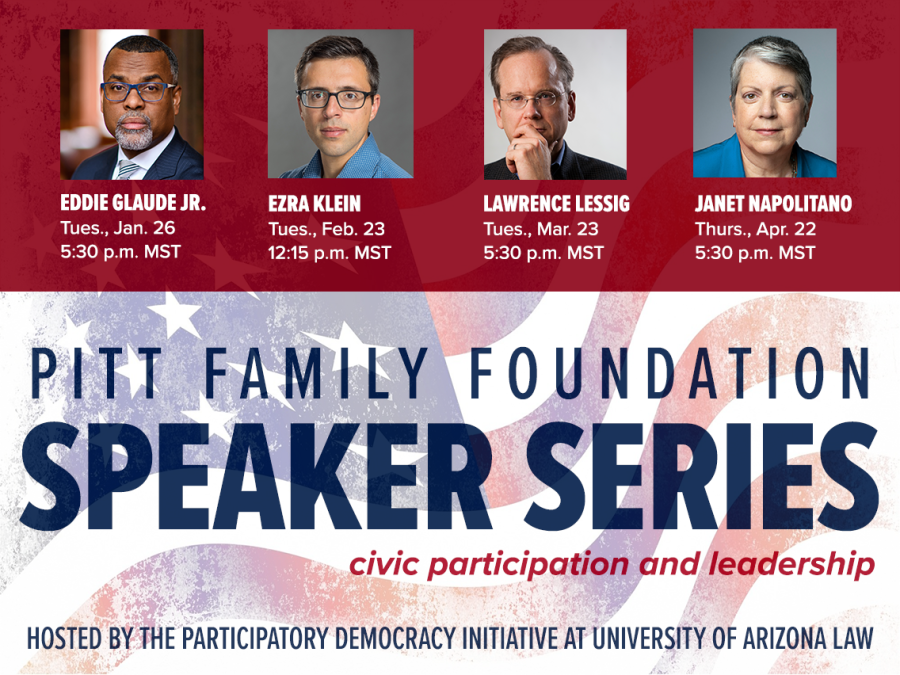While people around the country grapple with the implications, consequences and events that led up to the attack on the United States Capitol on Jan. 6, a group of notable experts are coming to the University of Arizona’s James E. Rogers College of Law to discuss the attack, the events that preceded it and what it means for the current state of American democracy and governance.
The event, titled the Pitt Family Foundation Speakers Series, is a group of presentations discussing law and democracy hosted by the Participatory Democracy Institute. The experts invited to the series are some of the most influential figures in today’s political landscape, a group of four national level leaders with extensive histories in academia, journalism, law and security policy.
All four events are set to be moderated by Arizona law professor and former mayor of Tucson Jonathan Rothschild, a local leader excited to engage in discussion about how we all can move democracy forward.
“We are very proud to have put together the line-up we have for Spring 2021,” Rothschild said via email. “Eddie Glaude, Ezra Klein, Lawrence Lessig, and Janet Napolitano should, together, enhance the continuing dialogue on how to move forward and rebuild meaningful civic participation in our community, state and nation.”
The first event of the four-part series starts Jan. 26 from 5:30 to 6:30 p.m. and will be held virtually and presented via Zoom. The following three speakers are set to present Feb. 23, March 23 and April 22, respectively.
Jan. 26: Eddie Glaude Jr.
Eddie Glaude Jr. is one of the nation’s leading experts and distinguished professors in the field of African American studies. He is the current head of the department of African American studies at Princeton University and proudly considers himself an American critic, writing like one of his role models, James Baldwin, about the sins of American racism and the stories and roles of Black figures in religion and politics.
Glaude has been a public critic of the racism seen in the policies and practices of the previous presidential administration.
In a speech titled “Democracy in Black,” Glaude said, “We saw [on Jan. 6] a mob of white grievance, of white resentment and white hatred. The genie is finally out of the bottle, and our task is not to push it back in, but to imagine the country without it, to imagine America as a truly multiracial democracy.”
Glaude’s insights will be important in discussing the role of racism in the attack of Jan. 6 and how race has played into the movements that were responsible for threatening our democratic process.
He is set to speak Jan. 26 at 5:30 p.m.
Feb. 23: Ezra Klein
Ezra Klein is the founder and editor-at-large of Vox media, one of the largest and comprehensive multimedia publications in the United States. Klein is also a columnist with the New York Times and was previously a columnist at the Washington Post and was a policy analyst for MSNBC.
Klein has extensive experience covering and reporting on the Trump administration and the policy agendas and ideologies of both the Democrat and Republican parties.
His book, “Why We’re Polarized,” succinctly explains the evolution of party ideology and identity politics in America, exploring the history of ideology polarization not only through politics but through social and cultural fractures and divisions.
On Nov. 7 for Vox, he published an article titled, “Trump is attempting a coup in plain sight.” Klein’s view as a journalist will provide a fresh perspective on the political anticipations behind the attacks of Jan. 6 and the power ideology politics has in creating immense division in today’s world.
Klein will speak as a part of the series on Tuesday, Feb. 23 at 12:15 p.m.
March 23: Lawrence Lessig
Lawrence Lessig, Roy L. Furman Professor of Law at Harvard is one of the leading minds in the field of democratic ethics, the intersection of law, social media and digital technology. His reputation is impressive, aside from clerking for Justice Antonin Scalia on the Supreme Court, he founded the University of Chicago’s Center for Internet and Society and is a founding board member of the world’s leading intellectual property organization, Creative Commons.
In his entire career, Lessig has written about democracy in peril, with published works titled “They Don’t Represent Us: Reclaiming our Democracy,” “America, Compromised,” and “Republic, Lost.”
His expertise in democratic ethics, internet and social media law and behavior will provide perception not only about the state of our democracy now, but how social media had a role in the organization of the Capitol attack and how social media played a major role in the formation of political movements and agendas leading up to Jan. 6.
Lessig is scheduled to speak on Tuesday, March 23 at 5:30 p.m.
April 22: Janet Napolitano
Janet Napolitano is widely considered one of Arizona’s most legendary politicians and one of the nation’s most brilliant minds in security policy. She has formerly served as the state’s governor, the state’s 23rd Attorney General and was formerly the Secretary of the Department of Homeland Security under President Barack Obama.
Not only did she hold all of these positions, but broke countless glass ceilings while doing so as Arizona’s first female Attorney General, our nation’s first female Secretary of Homeland Security and also the first female President of the University of California.
As the former head of the DHS, Napolitano’s perspective will be crucial in evaluating the very real security threat of nationalist domestic terror organization, which in October, her former department labeled as one of the greatest internal threats to our national security.
Napolitano is scheduled to speak on Thursday, April 22 at 5:30 p.m.
All events in the speaker series are free to attend, but registration for individual speakers is necessary.
Follow Ian Tisdale on Twitter









